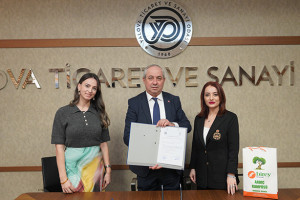
T.R. To the Ministry of Treasury and Finance We Conveyed Our Members' Requests
Yalova Chamber of Commerce and Industry President Cemil Demiryürek, Council Member Ömer Akdemir and YİK Member Vedat Yalçın visited Mr. Zekeriya Kaya in his office and had a meeting.
During the meeting, our requests regarding the provision of guarantee and assurance in Eximbank for our Shipyard Sector, the problems experienced in the closure of Customs Declarations, the differences in the Central Bank exchange rates, the VAT reduction requests of our Ornamental Plants Sector, the requests regarding inflation accounting records that concern all our members, and the opening of a Specialized Tax Office in Yalova were conveyed to the Deputy Minister.
Considering the contributions of Yalova to the country's economy as an important industrial and agricultural center, we would like to convey to our Minister of Treasury and Finance, Mr. Mehmet Şimşek, our Deputy Minister, Mr. Zekeriya Kaya, that rapid and effective steps should be taken for the following problems and solutions in Yalova. We presented our file containing our suggestions to further increase the economic potential of the country and make a greater contribution to the country's economy.
Eximbank Collateral and Assurance Problem: The shipyards region in Yalova carries out a large portion of the country's exports and makes a significant contribution to the shipbuilding sector. However, the problems experienced in obtaining foreign advances through bank advance letters negatively affect the sector. Providing collateral and assurance specifically for Eximbank is important to ensure a healthier functioning of the sector. Eximbank has initiated a work program with its sector partners on this issue and although this process has been brought to a certain extent, unfortunately, clear sanctions on this issue and aimed at solving the process have not been implemented yet.
Problem of Determining Exchange Rates in Accounting Records: Taking the Central Bank exchange rate as basis in the accounting records of cash export prices creates serious problems, especially in the shipyard sector. In order to avoid exchange rate risk in New Construction projects that last 2-3 years in the Shipbuilding industry, export revenues realized in different foreign currencies such as Norwegian Krone, the differences in the amount that arise when taking into account the Central Bank acceptance rates on the day of registration and the exchange rates on the day of closing the Provisional Declaration, the inability of our banks to cancel or make For this reason, it forces our members to defend themselves against the Tax offices. In this regard, we think that in closing Provisional Declarations, conversions made with the Central Bank exchange rates valid on the date of arrival of the amount should be taken as basis, or foreign currencies such as Norwegian Krone, which are major exports, should also be taken into account in the evaluations.
Request for Flexibility in Tax Regulations: Large industrial organizations operating in Yalova are experiencing difficulties in tax regulations. Since Yalova is a rapidly growing province where Organized Industrial Zones have been established and where large factories such as shipyards and AKKÖK Group are located, our large industrial enterprises are experiencing difficulties in matters such as tax regulations and VAT refunds. Therefore, it is requested to establish a Specialized Tax Office that can provide direct service to industrialists.
VAT Rate Regulation in the Ornamental Plants Sector: In Yalova, which is among the most important provinces of Turkey's ornamental plants sector, the sector has created serious employment and reached significant export figures. While the VAT rate for fruit sapling producers in agricultural production is 1%, the injustice between this rate and 20% VAT rate in the ornamental plants sector negatively affects the sector. It is requested that our Ornamental Plant producers benefit from the 1% VAT rate applied to agricultural producers and that the VAT rate be reduced.
Employers' Compensation Burden: Increasing minimum wage and the rise in other employee wages force employers to pay compensation. For this reason, it is requested that employers create a fund similar to the unemployment fund for compensation payments and benefit from this fund.




